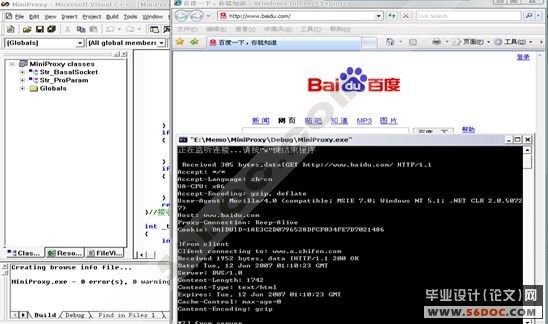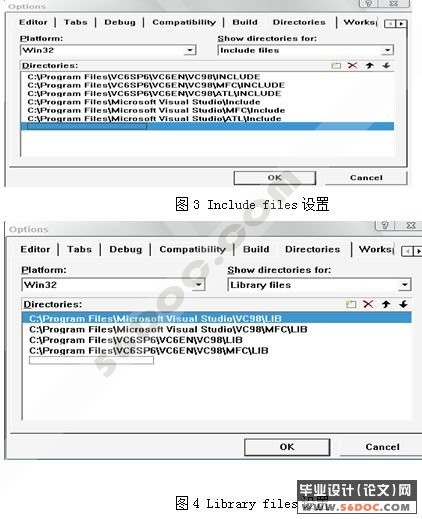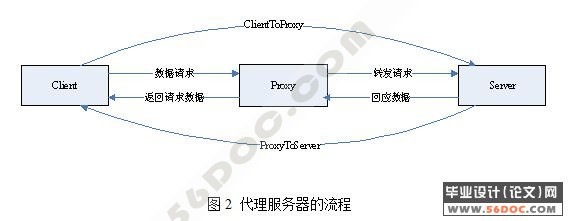VC++简易代理服务器的设计(Socket编程)
无需注册登录,支付后按照提示操作即可获取该资料.
摘 要
代理服务器是介于浏览器和Web服务器之间的一台服务器,它的功能是代理网络用户去取得网络信息。它的工作原理是,接收客户机的数据连接请求,并将请求传给Web服务器;再从Web服务器接收返回的数据,最后把数据传给客户端显示。本论文讲述的是关于一个简单的代理服务器的实现,在实现中采用客户机/服务器结构模型开发应用程序,基于一般的访问浏览速度慢、效率底、安全功能不强等原因,将以简单、合理、有效为原则;为了方便分析和设计,系统设计中设置不同的状态量用于标识客户机、代理服务器及服务器间的联结状态。在保证系统基本功能的同时,使用多线程机制使得代理系统有更好的延续性。此代理系统具有简单,易用,网络化等优点,能够完成一般的HTTP访问代理服务。
关键词:客户机/服务器结构;多线程;套接字;代理服务器
The Design of Simple Proxy Server
Abstract
The proxy server is a server which situates between the browser and a Web server. It’s principle of work is, it receives the connection request from the client, and hands down the requested to the Web server, then receives data which is returned from the Web server., finally hands it down the data to the client. In the realization, it adopts Client/Server structural model to develop application. Because of browse speed slow, low efficient and not safe enough, it takes simple, reasonable and effective as the principle. In the system design, it sets different states to identify client, proxy server and the connective state between servers. When the system's basic function are guaranteed, it use the multithreading to enable the proxy server to have a better continuous feature. This proxy system has the merit such as simple, easy to use and so on, and it can complete the proxy of general HTTP visit.
Key words: Client / Server architecture;Multithreading;Socket;Proxy Server
本课题的研究方法
此代理服务器系统将是建立在Windows NT平台上的网络应用程序设计。由于需要服务器为其他许多称为客户的主机提供服务,而客户主机又可以随时打开和关闭,在选择网络应用程序体系结构时就采用支持这些特点的客户机/服务器结构。还将运用Windows下网络编程的标准接口WinSock ,因为它允许两个或多个应用程序在相同机器上,或者是通过网络相互交流,它是真正协议无关的接口。为了便于直接使用Windows提供的网络编程接口,我们使用Microsoft Visual C++ 6.0作为开发工具,利用MFC类库中提供的两个Socket类CAsyncSocket和Csocket。使用这两个Socket类,我们可以运用面向对象的方法来进行Socket编程,而且它们还分别在较低和较高层次上封装了Windows Sockets API,为程序员开发Socket程序提供了便利。



目 录
1 引言 1
1.1 课题背景 1
1.2 本课题研究的意义 1
1.3 本课题的研究方法 1
2 理论基础 2
2.1 代理服务器 2
2.2 目前的代理服务技术 3
2.3 SOCKET 面向连接的编程模型 4
2.4 WINSOCK库 5
2.4.1 winsock的寻址方式 5
2.4.2 字节顺序 6
2.5 系统基本套接字调用 6
2.5.1 创建和关闭套接字-socket()和closesocket() 6
2.5.2 指定本地地址-bind() 6
2.5.3 设置监听状态-listen() 6
2.5.4 建立套接字连接-connect()和accept() 6
2.5.5 收发数据-send()和recv() 7
3 设计方案 7
3.1 基本函数设计 7
3.2 多线程流程 8
4 服务器的实现 8
4.1 环境创建 8
4.2 功能实现 9
4.2.1 数据变量定义 9
4.2.2 启动代理服务器 10
4.2.3 请求处理过程 11
4.2.4 请求响应 13
4.2.5 关闭服务器 15
4.2.6 控制主函数 15
5 测试结果 15
结 论 17
参考文献 18
致 谢 19
声 明 20
